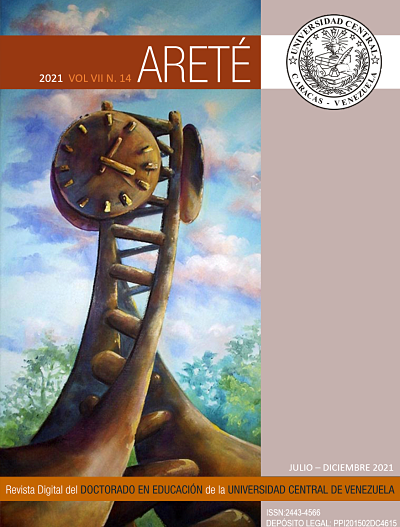Sustainable Educational Space: Contributions to Social Transformation
Keywords:
Public Policies, Transformative Environmental Education, Social and Environmental Sustainability,Abstract
We detail, in this text, the Sustainable Educator Space concept from the perspective of Transformative Environmental Education. For this, we use critical thinking in the analysis of national official documents that bring this concept and the reflection of Loureiro (2012) to support the emancipatory approach to Environmental Education. As a result, we infer that the official documents, even with textual variations, use the need for the triad physical space, management and curriculum approach for the representation of the concept of sustainable educator space (EES). Still, in this concept, the physical space is reconfigured for better appropriation of environmental goods, as well as for the creation of spaces for interaction and conviviality at school. Management is democratic and participatory and can count on the Environment and Quality of Life Commission for the development of actions and a political-pedagogical project, whereby the curriculum is developed with critical pedagogies and actions in favor of socio-environmental sustainability. Finally, we defend Transformative Environmental Education as a theoretical and methodological support for the transformation of Brazilian public schools into sustainable educator spaces.Downloads
References
Alves, G. L. (2004). A produção da escola pública contemporânea. (2ª ed.). Campinas, SP: Autores Associados; Campo Grande, MS: Editora UFMS.
Boff, L. (1999). Saber cuidar: ética do humano-compaixão pela terra. Petrópolis, RJ: Vozes.
Borges, C. O que são espaços educadores sustentáveis. In BRASIL. Espaços Educadores sustentáveis. (pp. 04-10). Salto para o futuro: TV Escola. Brasília, 2011.
Brasil. (2007). Formando Com-Vida – Comissão de Meio Ambiente e Qualidade de Vida na Escola: construindo Agenda 21 na escola. (2ª ed.). Brasília: MEC, CGEA.
Brasil. (2009a) Relatório sobre Sustentabilidade e Eficiência Energética: recomendações e sugestões. Brasília. Recuperado de: https://www.yumpu.com/pt/document/read/36493990/relatario-na-1-gt-matriz-energactica-cdes
Brasil. (2009b). Educação Ambiental (Série Cadernos Pedagógicos). Brasília: MEC, SEB. Recuperado de:http://educacaointegral.mec.gov.br/images/pdf/pme/educacao_ambiental.pdf
Brasil. (2010). Decreto n. 7.083, de 27 de janeiro de 2010. Brasília. Recuperado de: https://www2.camara.leg.br/legin/fed/decret/2010/decreto-7083-27-janeiro-2010-601492-publicacaooriginal-123119-pe.html
Brasil. (2012a). Resolução CNE/CP n. 2, de 15 de junho de 2012. Brasília. Recuperado de: http://portal.mec.gov.br/index.php?option=com_docman&view=download&alias=10988-rcp002-12-pdf&category_slug=maio-2012-pdf&Itemid=30192
Brasil. (2012b). Vamos Cuidar do Brasil com Escolas Sustentáveis: educando-nos para pensar e agir em tempos de mudanças socioambientais globais. Tereza Moreira (elaboradora). Brasília: MEC, SECADI.
Brasil. (2013a). Manual Escolas Sustentáveis: resolução CD/FNDE n. 18, de 21 de maio de 2013. Brasília. Recuperado de: http://pdeinterativo.mec.gov.br/escolasustentavel/manuais/Manual_Escolas_Sustentaveis_v%2005.07.2013.pdf
Brasil. (2013b). Diretrizes Curriculares Nacionais da Educação Básica. Brasília: MEC, SEB, DCEI. Recuperado de: http://portal.mec.gov.br/index.php?option=com_docman&view=download&alias=13448-diretrizes-curiculares-nacionais-2013-pdf&category_slug=junho-2013-pdf&Itemid=30192
Brasil. (2014). Programa Nacional Escolas sustentáveis. Versão Preliminar. Brasília. Recuperado de: https://drive.google.com/fle/d/0b0W7JkekedaSyzfhS3JNZzhfZeu/
Carvalho, I. C. M. (2010). Educação Ambiental: a formação do sujeito ecológico. (5.ed.). São Paulo: Editora Cortez.
Freire, P. (1979). Conscientização: teoria e prática da libertação: uma introdução ao pensamento de Paulo Freire. São Paulo: Cortez & Moraes.
Freire, P. Quatro cartas aos animadores de Círculos de Cultura de São Tomé e Príncipe. In: BEZERRA, Aída; BRANDÃO, C. (Org.). A questão política da educação popular. São Paulo: Brasiliense, 1980.
United Kingdon. (2007) House of Commons. Sustainable schools: are we building schools for the future? London: Education and Skills Committee, House of Commons.
Leff, E. (2002). Epistemologia Ambiental. (3.ed.). São Paulo: Cortez.
Leff, E. (2009). Complexidade, Racionalidade Ambiental e Diálogo de Saberes. Revista Educação & Realidade, v. 34, n. 3. 17-24.
Loureiro, C. F. B. (2004). Educação Ambiental Transformadora. In BRASIL. Identidades da Educação Ambiental Brasileira. LAYRARGUES, Philippe Pomier (coord.). (pp. 64-84) Brasília: MMA.
Loureiro, C. F. B. (2012). Trajetórias e fundamentos da educação ambiental. (4.ed.). São Paulo: Cortez.
Marx, K. (1859). Introdução à Contribuição para a Crítica da Economia Política. Recuperado de: https://www.marxists.org/portugues/marx/1859/contcriteconpoli/introducao.htm
Moreira, T. (2011) Escolas Sustentáveis: currículo, gestão e edificações. In: Brasil. Espaços educadores sustentáveis. Ano XXI. Boletim 07. Salto para o Futuro: TV Escola, Brasília.
Morin, E. (2002). Em busca dos fundamentos perdidos. Porto Alegre: Sulina.
Morin, E. (2005). Ciência com consciência. (8ª ed.). Rio de Janeiro: Bertrand Brasil.
Siqueira, J. F. R. & Zanon, A. M. (2019). Programa Nacional Escolas Sustentáveis: compreendendo os conceitos de escola sustentável e espaço educador sustentável. Revista Pedagógica, Chapecó, v. 21, 539-536. DOI: http://dx.doi.org/10.22196/rp.v22i0.4987
Trajber, R. & Moreira, T. (2010) Escolas Sustentáveis e Com-Vida: Processos formativos em educação ambiental. Ouro Preto: UFOP.
Trajber, R. & Sato, M. (2010). Escolas Sustentáveis: incubadoras de transformações nas comunidades. Revista Eletrônica do Mestrado em Educação Ambiental, v. especial, 70-78. DOI: https://doi.org/10.14295/remea.v0i0.3396
Downloads
How to Cite
Issue
Section
License
This journal provides free, immediate access to its content under the principle of making research freely available to the public, which fosters a greater exchange of global knowledge.
Authors who publish in Areté, Revista Digital del Doctorado en Educación, agree to the following terms:
- Authors retain copyright and grant the journal the right to be the first publication of the work, as well as licensed under a Creative Commons Attribution License that allows others to share the work with an acknowledgement of authorship of the work and initial publication in this journal.
- Authors may separately establish additional agreements for the non-exclusive distribution of the version of the work published in the journal (for example, placing it in an institutional repository or publishing it in a book), with an acknowledgement of its initial publication in this journal and not to be used for commercial purposes.
- The contents and images included in the articles are the responsibility of the author(s). Areté, Revista Digital del Doctorado en Educación, is not responsible for the information included in them.
- Authors agree with the license of use used by the journal, with the self-archiving conditions and with the open access policy.
- Authors are allowed to disseminate electronically (e.g., in institutional repositories or on their own website) the published version of their work, as it favors its earlier circulation and dissemination and thus a possible increase in its citation and reach among the academic community.
- In case of reuse of published works, the existence and specifications of the license of use must be mentioned, as well as the authorship and original source of publication.







